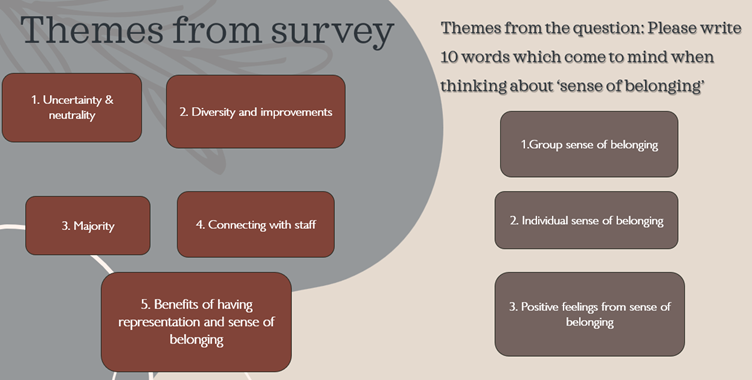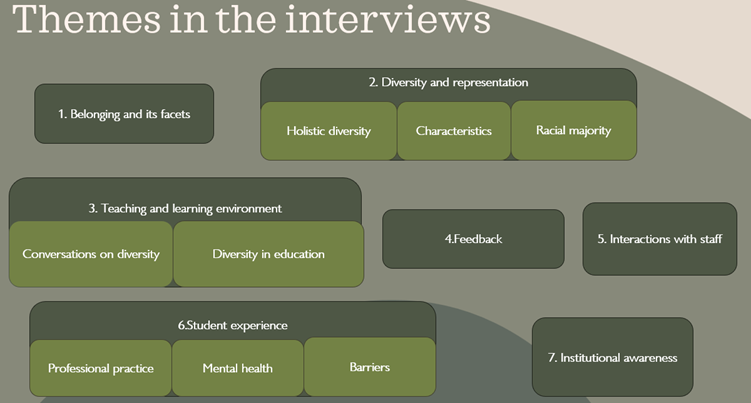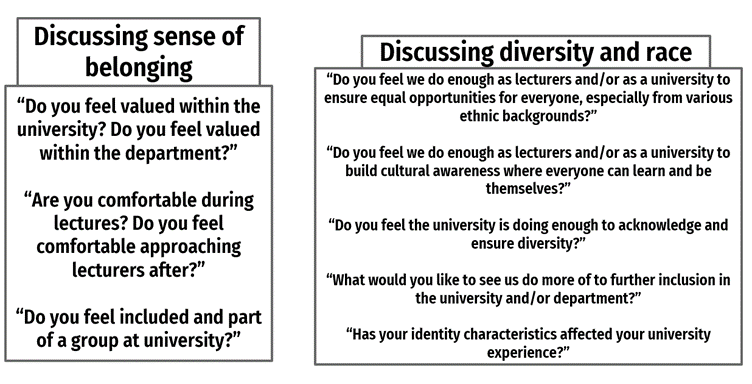By:
1. Denethri Gamagedara, Psychology Undergraduate and UROP student, d.gamagedara@reading.ac.uk;
2. Anjali Mehta Chandar, Lecturer, Charlie Waller Institute, a.m.chandar@reading.ac.uk;
3. Professor Allán Laville, Dean for Diversity and Inclusion, allan.laville@reading.ac.uk;
4. Hannah Raheja, Research Assistant, h.raheja@student.reading.ac.uk

Overview
Following the University of Reading’s (UoR) Race Equality Review (UoR, 2021), this Undergraduate Research Opportunities Programme (UROP) project took place, consisting of a student survey and two student interviews conducted in the Charlie Waller Institute (CWI), a department within the School of Psychology and Clinical Language Sciences. The aim was to investigate students’ perception of staff racial representation and its impact on students’ sense of belonging. Students felt that diversity explicitly needed to be integrated into the teaching and learning environment. A range of recommendations are provided.
Objectives
The objectives of this pilot study were:
- To understand how staff racial representation impacts CWI students’ sense of belonging.
- To explore student sense of belonging in CWI, a department that consciously integrates diversity and inclusion into teaching.
- To contribute towards diversifying teaching and learning material and maximising student-staff interactions.
Context
The Race Equality Review (UoR, 2021) underlined racial representation as a salient factor for fostering sense of in its students. As Strayhorn (2018) outlines, sense of belonging is broadly defined as “students’ perceived social support on campus, a feeling or sensation of connectedness, the experience of mattering or feeling cared about, accepted, respected, valued by, and important to the group (e.g., campus community) or others on campus (e.g., faculty, peers).” Focus groups within the review highlighted that a lack of staff from minor ethnicities reinforced students’ isolation and lack of belonging within the university. When present, sense of belonging promotes successful learning by improving student engagement, encouraging students to seek campus resources and acting as a buffer from mental health issues (Gopalan & Brady, 2019). This was consistent with comments made in focus groups, where inclusion and sense of belonging were seen as important to the student experience.
The primary reason for conducting this study within CWI was because of the institute’s particular interest in ensuring diversity and inclusion (D+I), and it has an award-winning D+I working group. An institute in the School of Psychology, CWI specialises in postgraduate, vocational training for mental health practitioners. Within the teaching material, students are taught to think about a therapy client’s protected characteristics and engage in conversations about their diverse cultural backgrounds. It was deemed interesting to see how students at an institute that overtly discusses diversity felt about their sense of belonging to the university (potentially based on their racial identity).
Denethri Gamagedara conducted this study as part of UROP. This study was particularly important to her because of the possible implications of institutional improvement for students similar to herself. The project had two supervisors: Anjali Mehta Chandar, a Lecturer in CWI with a keen interest in D+I, and Allán Laville, both a Professor in the department and the University’s Dean of Diversity and Inclusion. Hannah Raheja, a CWI undergraduate student, aided in the project in the role of a research assistant, particularly supporting with the thematic analysis and dissemination.
Implementation
The study involved conducting a survey and two individual participant interviews with the students of CWI. The questions were co-designed by Denethri and Anjali. Sixteen students responded to this survey while three students volunteered for the interview, however only two proceeded to be interviewed due to availability. Responses were analysed using reflexive thematic analysis and discussed with Anjali and Allan. Coding and clustering were completed by Denethri and Hannah, with inter-coder agreement scores of 95.5% and 85.3%. Figure 1 and Figure 2 below outline the themes and sub-themes that emerged from the data.
Figure 1
Themes from the survey

Figure 2
Themes (dark green) and sub-themes (light green) from the interviews

Impact
The research team devised the following recommendations for teaching staff to foster a sense of belonging for students and address diversity.
1 Openness in introductions: Lecturers to mention their own protected characteristics and routes to becoming an academic can be beneficial, particularly during their initial introduction to the cohort e.g. first teaching session. Students had perceptions that only individuals who fit certain criterion could become lecturers (e.g., majority ethnicity and higher socioeconomic status).
2 Showing cultural awareness: Acknowledging cultural events in lectures, Blackboard announcements or emails helps students feel accepted and valued. This allows for better student-staff connection.
3 A discussion blog: Implementing a blog where lecturers can talk about being a professional from a minoritised background is helpful. For example, departments might like to host this on Blackboard, with a new blog each month, or in the student newsletter which is sent out once a term. Students recognised the importance of holistic diversity and wished for more openness about this.
4 Teaching resources: Representation extends to teaching material. has conducted work into decolonising the curriculum, with a more recent publication in September about steps on how to achieve this.
5 Discussing belonging with academic tutees explicitly: Students reported that openness was crucial and belonging involved feeling comfortable and valued. Figure 3 (below) provides examples on how to address sense of belonging.
6 Discussing diversity, notably race, with tutees: Students mentioned that acceptance contributed to belonging. Creating a safe space for students may improve student-staff relationships. Figure 3 (below) has potential questions related to race.
Figure 3
Questions related to sense of belonging and diversity to ask tutees

Reflections
Conducting the study was extremely beneficial as it created the opportunity to think about recommendations to improve student sense of belonging. The results showed that only 31% of students agreed to the statement “I feel a sense of belonging within CWI”, with 25% neither agreeing nor disagreeing, 18.8% disagreeing and 25% strongly disagreeing – this suggests that there is room for improvement.
The study was successful because of the efficient pedagogical partnerships that were formed. Anjali, who was the main supervisor during the project, created a creative space where Denethri and Hannah, as undergraduates, could openly express their opinions. Whilst having Allan’s perspective and expertise helped Denethri and Hannah cluster themes effectively and think about tangible recommendations that lecturers can implement. The positive outcomes, particularly the opportunity to conduct more thorough analysis with a variety of researchers, will hopefully encourage more students and lecturers to apply for the UROP scheme in subsequent years too.
The study may have been better implemented if there was an opportunity to hear from a group of students, such as in a focus group setting. This was part of the original methodology, however, only one student volunteered for this, which therefore had to become an individual interview instead. Focus groups and/or creative styles of evaluation and student voice (such as zine-making) could be incorporated into future replications of this study.
Follow up
The recommendations have been included in a screencast for dissemination to staff groups within CWI, which is viewable here for other UoR colleagues to also view. A reflective paper about the impact of pedagogical partnerships formed from the study is in the process of being published. A pre-print in the style of a lab report is also hoping to be published. It is likely that future projects will look into the effectiveness of the recommendations, perhaps in the form of student or staff feedback.
References
- Gopalan, M., & Brady, S. T. (2020). College students’ sense of belonging: A national perspective. Educational Researcher, 49(2), 134-137.
- Strayhorn, T. L. (2018). College Students’ Sense of Belonging: A Key to Educational Success for All Students. Routledge.
- University of Reading (UoR). (2021). Race equality review. University of Reading. https://static.reading.ac.uk/content/PDFs/files/race-equality-review-report-2021.pdf